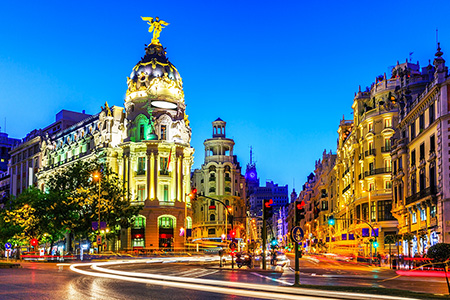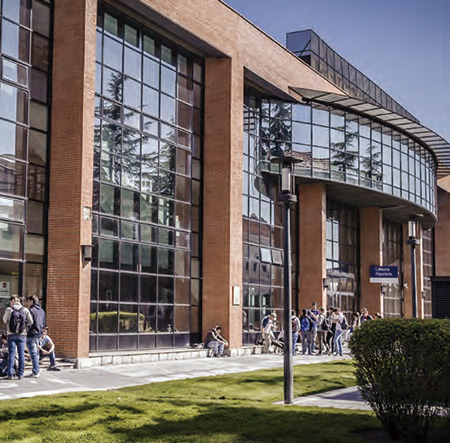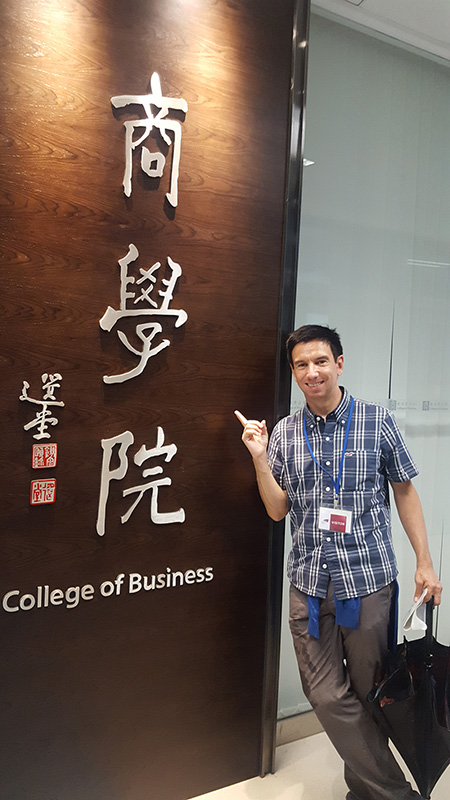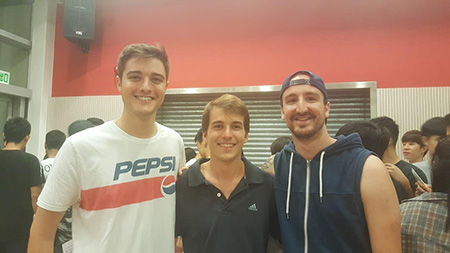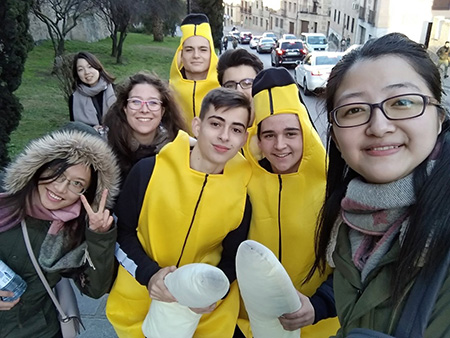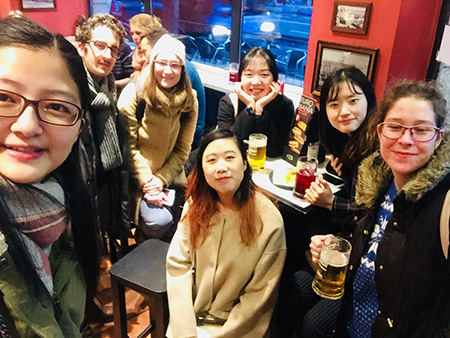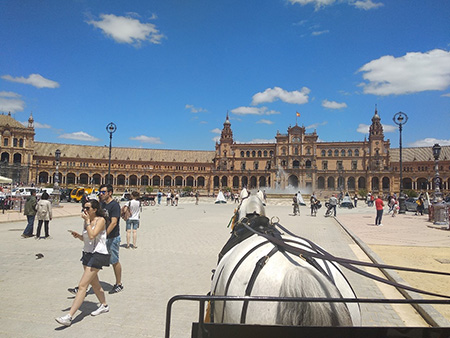David Gil Perez is Head of International Mobility at the Charles III University of Madrid, and teaches organization and innovation courses at the university's Business Economics Department. He visited the College of Business in August, as part of an initiative to increase exchange opportunities between CityU and UC3M, when City Business Magazine caught up with him.
What kind of university is UC3M?
Very dynamic, and quite new – this coming year we will celebrate our thirtieth anniversary. We were the first university in Spain to introduce English as a teaching medium, so we have always been outward looking, and 20% of our students are international. We also have one of the highest level of entrants in Spain, and like CityU we are very research-orientated.
How can we expand connections between our universities?
We signed an exchange agreement with the College of Business some years ago, and we thought it was time to move forward, a chance to perhaps expand numbers and also the scope of our collaboration. The Erasmus Plus programme means we can now apply for funding for university exchange in countries outside Europe, and not only for the exchange of students but also for the exchange of professional and faculty members so we can establish research collaboration, perhaps based initially on giving seminars in one another's institutions.
What special features could attract our CityU students to your university?
We have students from 57 different countries, but we limit international numbers to 25% per class so students can experience full immersion in a Spanish environment. Incoming students will have a chance to learn some Spanish. We offer medium-sized practice sessions with a maximum of 40 people, so you are going to get to know your professors.
How important is the teaching of business in the context of the humanities?
We have a strong focus on business, but offer humanities in all degrees, so yes, students need to take courses in other areas, and we do value placing business in broader contexts.
What major innovations have you seen in the Spanish business community in recent years?
We have faced a major recession over the last ten years. In the old days students would aspire to be becoming civil servants. Nowadays about 40% of people are looking to start their own business. The idea of Spain as an entrepreneurial country is new. At the same time many universities are offering innovative degrees in up-and-coming areas such as medical or space engineering, robotics or artificial intelligence.
Are you teaching new skills sets?
Yes, we teach electives in drawing up business plans, and we have an incubator for students wanting to establish start-ups. We also see many students who want to go overseas to study entrepreneurial skills or innovation.
How international is Madrid?
Madrid has changed beyond all recognition in the last ten years. It used to be the case that Barcelona was the international attraction, and Madrid was more like a big Spanish village. Now, you can hear English being spoken all over Madrid. There are new hotels and restaurants opening monthly. In that sense it is like London, one of the fastest changing cities in Europe. We have had very hard times, but now Madrid is on fire. Four years ago, we were struggling to place our Spanish students in work. Now international students are finding placement opportunities.
How important are Spain's connections with China?
There is a big market for the Spanish language in China, and I have been invited several times to give presentations to the China Scholarship Council about Spanish universities. Spain is part of the Belt and Road Initiative, and is seen as a gateway to the Latin American market, which of course is enormous.
Have attitudes towards internationalization changed in Spain since UC3M was founded in 1989?
Yes, universities perhaps used to feel that offering courses in English was somewhat problematic, perhaps not worth the extra effort. UC3M was designed from the beginning with courses offered in English. Universities are increasingly proud of attracting overseas students who are more welcome than ever.
And finally what are your impressions of Hong Kong?
It strikes me as being a very vibrant, international city. We are lucky to have direct flights from Madrid these days. It's been raining all week so not easy to get out and see places. Maybe this gives me an excuse to come back.
Germán Muñoz
Exchange student of City University of Hong Kong
I arrived in this enormous city almost two weeks ago and I can already say that I love it. At the beginning I have to say it was a great shock for me. I lived the past year in Los Angeles on the exchange programme at the University of Southern California, but this was completely different to any place that I had been before.
In Hong Kong everything happens really fast, the first impression you get of the city is its gigantic buildings that shape its harbour, but after some days here I can tell that this urban life blends with the very special nature that surrounds the city, making Hong Kong a very special place to live. Coming from Carlos III has been a big impact for me, since life in Spain is much calmer and the weather seems to be more tropical here. Apart from that, school seems to be as exigent as in Carlos III.
As a student, my first impression was that CityU was not the average university that we are used to in Europe or America. This university is actually integrated in the city, but here you can still find enough space to do some sports or just have a rest with friends.
I spent the last year at an American university, but for the moment I can say that this experience is more fruitful for me, since the cultural shock with all the differences that I have found here has taken me out of my comfort zone, challenging me, which I think in the end will make me a better person.
Rafael Hidalgo
Exchange student of City University of Hong Kong
I study in the University “Carlos III de Madrid� and around the world – thanks to the many agreements that my home university has with other international universities. Before coming to CityU, I went to the Copenhagen Business School with the European programme called ERASMUS, a total new experience to learn more widely how countries work on a global basis. But not satisfied with limiting that experience to Europe I decided to continue travelling and arrived in Asia, a new start. Hong Kong is known worldwide for its economic importance and as a door to Asia due to its western influence, so how was I going to miss the opportunity to come to the “new land of success�?
When I arrived, I was surprised by the good organisation of the public transport, a total challenge for the amount of people who live here and depend daily on it. Also, Hong Kong has a perfect economy, with people in the streets or malls at any time of the day with enough purchasing power to get the economic activity of any business working no matter its size. Contrast the West, where big enterprises are taking over the market by acquiring small businesses.
I think the biggest challenge usually tends to be the language when you go abroad. That makes Hong Kong the perfect destination for you to feel at home and enjoy a hundred percent the experience, because it gives you the security of being able to solve any problem if it arises.
Germán (left) and Rafael (middle)
Mandy Mau Hau Man
Exchange student to Charles III University of Madrid
Madrid is a modern city, an amazing mix of commercial and traditional. The weather from January to June is very comfortable, it is not very cold in winter, around 5°C. So, I was surprised when we had snow on a few days. It was so beautiful, and I didn't feel cold at all.
I usually met new friends during classes or activities of Erasmus Student Network. Since I was studying English medium classes, many of the classes were with exchange students as well as Spanish students. It was easy to meet new friends as we had a lot of group activities. Also, trips to Toledo, Aranjuez, Cuenca, Segovia etc. were organised. We would often make a group of friends and go to explore Madrid and the towns nearby.
Evening parties are very common in Spain. People will party on almost any day like Monday Blues party, Crazy Friday party, and Chill on Saturday party. They mainly drink beer and sangria, which is a special drink in Spain. Sangria is a mixed with red wine/white wine, orange and lemon juice, soda and some fresh fruit. It is suitable for girls since it tastes sweet and fresh.
For me exchange was about exploration. I not only explored the world more and broadened my horizons, but also got to know more about my strengths and weaknesses. It was more than a trip, it was a valuable, long-lasting and profound experience.
España, volveré!
This photo was taken in Plaza de Espana, Sevilla deemed as the most beautiful plaza in Spain. We rode in a horse-drawn carriage there
